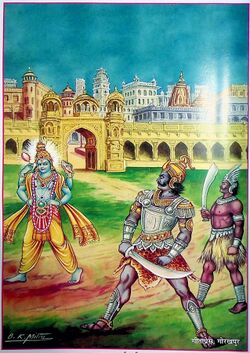Astronomy:Kalayavana
Kalayavana (Sanskrit: कालयवन, romanized: Kālayavana, lit. 'black Greek')[1] is a king in Hinduism. He is stated to have invaded Mathura with an army of 30 million yavanas (barbarians) against Krishna.[2][3]
Legend
The Brahmanda Purana 14.46ff narrates the following story of Kalayavana's birth: a woman named Vrka-devi decided to test the virility of Gargya (IAST: Gārgya, "descendent of Garga"). Gargya was unable to ejaculate, for which the Yadavas insulted him. After a 12-year penance, Gargya got a boon from Mahadeva that he would get a son who would destroy the Yadavas. During his penance, he ate iron fillings that made his complexion iron-black (kāla). Subsequently, Gargya came to Mathura, and had sex with a cowherd's daughter (gopi), who was actually an apsara in disguise. Kalayavana was the result of this union: Garga crowned him as the new king, and left for the forest.[4]
According to the Vishnu Purana and Harivamsa, Kalayavana was a Yavana king. He was the partial incarnation of Krodha.[5][6]
Jarasandha, Kamsa's father-in-law, and the ruler of Magadha attacked Mathura seventeen times, but is beaten by Krishna every time. Jarasandha, unable to defeat Krishna on his own, made an alliance with Kalayavana. Kalayavana had become a powerful Yavana warrior, who had gotten a boon from Shiva that on the battlefield, he would be undefeatable.[7]
Krishna, in order to defend his people, built a formidable city, named Dvaraka, to which he transported the inhabitants of Mathura.[8] Kalayavana attacked Mathura with an army of 30 million Yavanas. Krishna, realising that the Yavanas had greatly outnumbered all the Yadavas, decided to challenge Kalayavana for a duel. Krishna strategically fled the battlefield. Krishna lured Kalayavana into the cave where the great king of Treta Yuga, Muchukunda, one of the forefathers of Rama, was in a deep slumber of thousands of years after helping the devas in an epic war with the asuras.[9]
Desiring an absolutely undisturbed sleep, he had been given a boon by Indra that anyone who dared to disturb his sleep would get burnt to ashes immediately.[7] In the Dvapara Yuga, in the darkness deep inside the cave, Krishna covered Muchukunda with his scarf. Kalayavana, assuming him to be Krishna, kicked him, thus disturbing the king's sleep, and being reduced to ash. Muchukunda was delighted to see Krishna there. Krishna advised him to perform tapasya to cleanse his accumulated sins to attain moksha. After meeting the deity, Muchukunda set out of the cave. Muchukunda then travelled north to Gandamadana Mountain, and from there, to Badrikashrama, for doing penance and finally achieved liberation in the form of moksha.[10][11]
In popular culture
The hills and the cave where Muchukunda rested is held by locals to be located at Ranchodji teerth, district Lalitpur, in the state of Uttar Pradesh.[12]
References
- ↑ Walker, Benjamin (2019-04-09) (in en). Hindu World: An Encyclopedic Survey of Hinduism. In Two Volumes. Volume I A-L. Routledge. pp. 380. ISBN 978-0-429-62465-0. https://books.google.com/books?id=6zj3DwAAQBAJ&dq=kalayavana+black+Greek&pg=PA380.
- ↑ Nivedita, Sister (2001). Myths and legends of the Hindus and Buddhists. Ananda K. Coomaraswamy (1st Indian ed.). Kolkata [India]: Advaita Ashrama, Publication Dept. ISBN 81-7505-197-3. OCLC 53466600. https://www.worldcat.org/oclc/53466600.
- ↑ Dowson, John (2000) (in en). A Classical Dictionary of Hindu Mythology and Religion, Geography, History and Literature. Psychology Press. ISBN 978-0-415-24521-0. https://books.google.com/books?id=UHOPiD5LcfwC&q=Dowson's+Classical+Dictionary+of+Hindu+mythology.
- ↑ Thaneswar Sarmah (1991). The Bharadvājas in Ancient India. Motilal Banarsidass. pp. 128–129. ISBN 9788120806399. https://books.google.com/books?id=xFyu7MANWPAC.
- ↑ Dutt, Manmatha Nath, ed (1897). A Prose English Translation Of Harivamsha. http://archive.org/details/AProseEnglishTranslationOfHarivamsh.
- ↑ www.wisdomlib.org (2014-08-30). "Burning of Yavana king, Kalayavana and praise of Mucukunda to Kansa [Chapter XXIII"] (in en). https://www.wisdomlib.org/hinduism/book/vishnu-purana-wilson/d/doc116045.html.
- ↑ 7.0 7.1 "HARIVAMSHAM (GEETA PRESS)". http://mahabharata-resources.org/ola/ky_GP.html.
- ↑ "THE KRISHNA AVATĀRA". http://www.sacred-texts.com/hin/hmvp/hmvp26.htm.
- ↑ "A Hindu King who Slept for Almost 4 Million Years!" (in en-US). 2015-08-24. https://haribhakt.com/a-hindu-king-who-slept-for-almost-4-million-years/.
- ↑ "Muchukunda". http://www.mythfolklore.net/india/encyclopedia/muchukunda.htm.
- ↑ "Mytholgical Story : Krishna and Muchkunda". https://www.kidsgen.com/fables_and_fairytales/indian_mythology_stories/krishna_and_muchkunda.htm.
- ↑ "Muchkund Cave | District Lalitpur, Government of Uttar Pradesh | India" (in en-US). https://lalitpur.nic.in/en/tourist-place/muchkund-cave/.
 |




